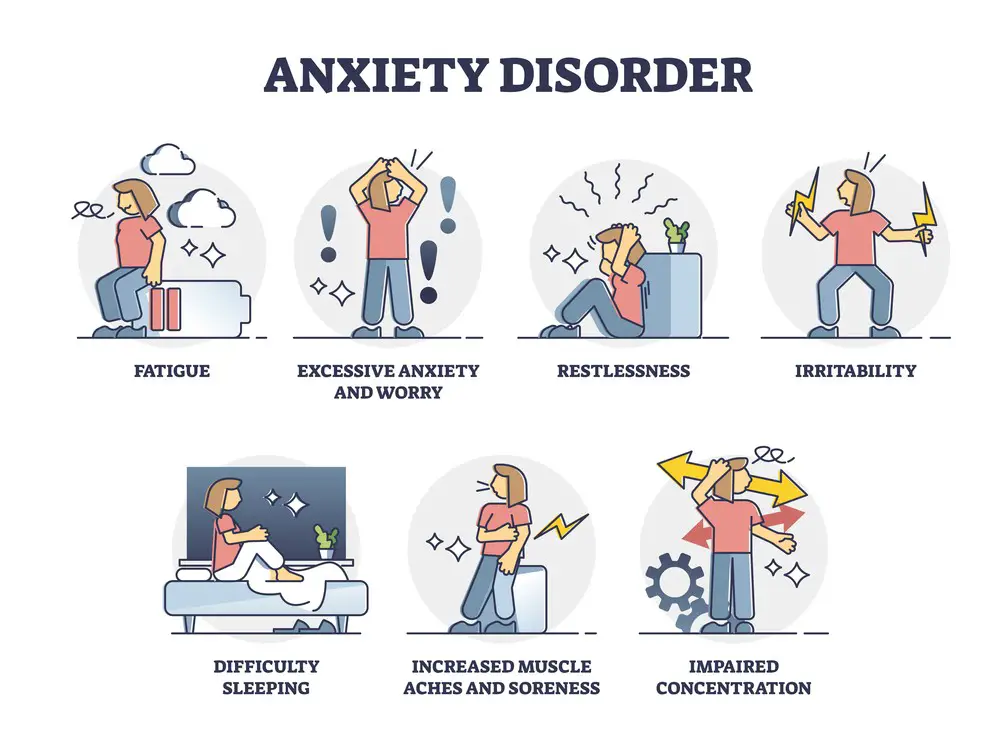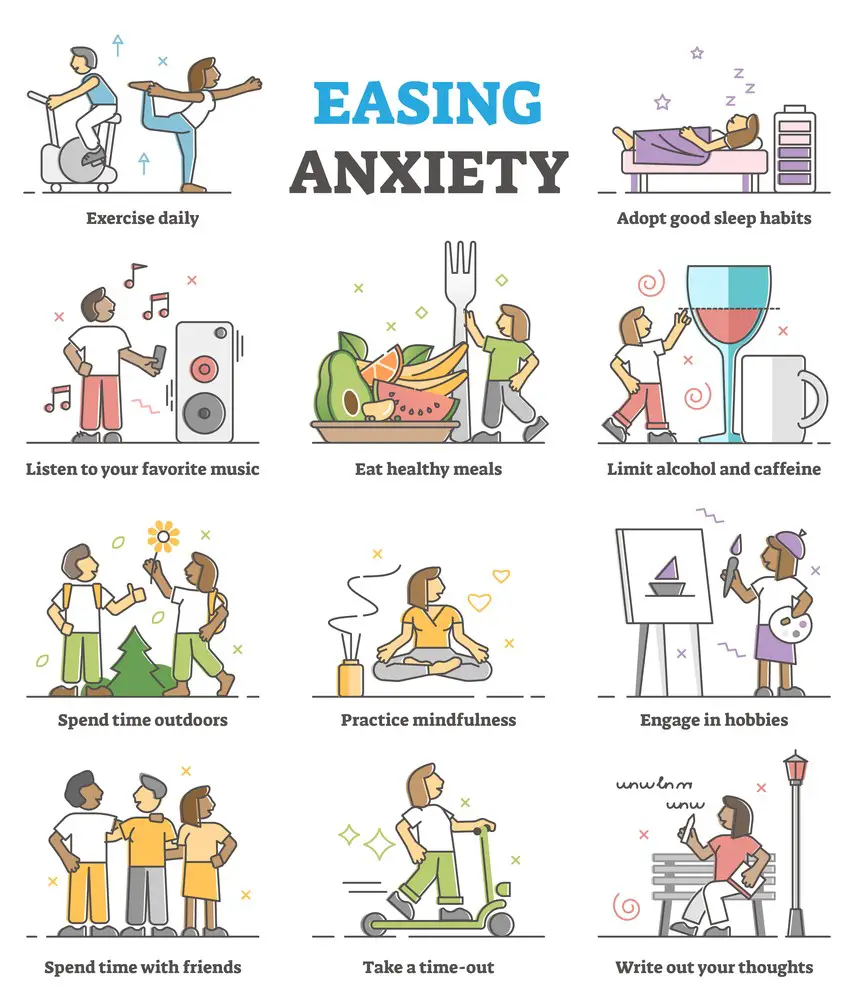As a BetterHelp affiliate, we receive compensation from BetterHelp if you purchase products or services through the links provided
Are you a teenager struggling with anxiety? You’re not alone. According to the National Institute of Mental Health, 31.9% of adolescents aged 13-18 have been diagnosed with an anxiety disorder. While some level of anxiety is expected during the teenage years, it’s important to recognize when your anxiety may be crossing the line into something more severe.
In this blog post, we’ll discuss the signs that it’s time to seek professional help for your anxiety and provide some helpful tips on how to cope with and manage your symptoms. Whether you’re a teenager dealing with anxiety yourself or a parent concerned about your child, this post will offer valuable information and resources to support you on your journey towards better mental health. Let’s get started.
Anxiety is Impacting Your Daily Life
 If you find that your anxiety is starting to interfere with your daily life, it may be time to seek professional help. This could mean having frequent panic attacks, struggling to concentrate in school or work, avoiding social situations, or experiencing difficulty sleeping due to anxious thoughts. These disruptions can significantly impact your ability to function and enjoy day-to-day activities.
If you find that your anxiety is starting to interfere with your daily life, it may be time to seek professional help. This could mean having frequent panic attacks, struggling to concentrate in school or work, avoiding social situations, or experiencing difficulty sleeping due to anxious thoughts. These disruptions can significantly impact your ability to function and enjoy day-to-day activities.
If you notice that anxiety is becoming a hindrance rather than something you can manage on your own, it’s essential to reach out for support. For instance, teenage therapy can provide you with coping strategies and support to help manage your anxiety. Ensure you prioritize your mental health and well-being by seeking professional help.
Physical Symptoms are Persistent
Anxiety can manifest itself in physical symptoms such as headaches, stomachaches, rapid heart rate, and muscle tension. While experiencing occasional physical symptoms is normal during bouts of anxiety, if they become persistent and interfere with daily life, it may be time to seek professional help.
Physical symptoms can also be a sign that your anxiety is more severe than you may have initially thought. Addressing and finding ways to manage these symptoms is essential, as they can significantly impact your overall well-being. A mental health professional can work with you to identify the root causes of your physical symptoms and provide effective treatment strategies to alleviate them.
You’re Avoiding Activities or Situations Due to Anxiety
 Avoidance is a common coping mechanism for those struggling with anxiety. It may feel easier and less stressful to avoid certain activities or situations that trigger your anxiety, but this can lead to a vicious cycle of avoidance and more intense anxiety in the long run.
Avoidance is a common coping mechanism for those struggling with anxiety. It may feel easier and less stressful to avoid certain activities or situations that trigger your anxiety, but this can lead to a vicious cycle of avoidance and more intense anxiety in the long run.
If you find yourself constantly avoiding social events, school or work commitments, or even leaving your house due to anxiety, it may be time to seek professional help. A therapist can help you develop healthy coping mechanisms and strategies to gradually face and manage your fears in a safe and supportive environment. Don’t let anxiety hold you back from living your life to the fullest.
Your Worries are Excessive and Interfering with Normal Activities
 It’s normal to worry about things from time to time, but if your worries become excessive and interfere with your ability to carry out daily tasks, it may be a sign of an anxiety disorder. This could manifest as constantly worrying about school work, relationships, or upcoming events to the point where it becomes overwhelming and consumes your thoughts.
It’s normal to worry about things from time to time, but if your worries become excessive and interfere with your ability to carry out daily tasks, it may be a sign of an anxiety disorder. This could manifest as constantly worrying about school work, relationships, or upcoming events to the point where it becomes overwhelming and consumes your thoughts.
If excessive worrying impacts your ability to function, seeking professional help can provide you with tools and techniques to manage these thoughts. Therapy can also help identify any underlying issues contributing to your worries and address them in a supportive, non-judgmental environment.
Difficulty Coping and Managing Anxiety on Your Own
 While it’s important to develop coping strategies to manage anxiety on your own, there may come a point where these techniques are not enough. If you find that your anxiety is becoming increasingly challenging to manage and you’re struggling to cope on your own, it’s time to seek professional help.
While it’s important to develop coping strategies to manage anxiety on your own, there may come a point where these techniques are not enough. If you find that your anxiety is becoming increasingly challenging to manage and you’re struggling to cope on your own, it’s time to seek professional help.
A therapist can work with you to identify the root causes of your anxiety and provide personalized treatment strategies to help you manage and cope with your symptoms. They can also offer a supportive and non-judgmental space for you to express your feelings and concerns, which can be incredibly beneficial in managing anxiety.
Friends and Family Express Concern About Your Well-Being

Sometimes, those closest to us may recognize signs of anxiety in us before we do. If your friends and family have expressed concern about your well-being, taking their concerns seriously and considering seeking professional help is essential.
It can be challenging to acknowledge that our anxiety may be negatively affecting those around us, but seeking support from a therapist can not only benefit ourselves but also our relationships with others. A mental health professional can provide guidance and support for both you and your loved ones to help you navigate through your anxiety as a team. Don’t be afraid to reach out and ask for help when needed.
Navigating teenage anxiety can be a challenging journey. However, recognizing the signs that it’s time to seek professional help can significantly benefit your mental health and overall well-being. Whether it’s persistent physical symptoms, excessive worrying, or difficulty coping on your own, reaching out for support is an essential step toward managing your anxiety. Remember to prioritize your mental health, and don’t be afraid to seek help from a therapist or other mental health professional. With the right support and tools, you can learn to manage your anxiety and live a fulfilling life.
Empowering Yourself: Simple Strategies to Tackle Anxiety
 Navigating through the maze of teenage anxiety can indeed feel overwhelming, but remember, you’re not alone in this. With the right strategies and a bit of guidance, you can begin to take control of your anxiety rather than letting it control you. Here are some practical tips to help you manage anxiety on a day-to-day basis:
Navigating through the maze of teenage anxiety can indeed feel overwhelming, but remember, you’re not alone in this. With the right strategies and a bit of guidance, you can begin to take control of your anxiety rather than letting it control you. Here are some practical tips to help you manage anxiety on a day-to-day basis:
- Create a Routine: Establishing a daily routine can provide stability and predictability, which can be comforting when everything else feels chaotic. Try to maintain regular sleep patterns, eat healthy meals consistently, and allocate specific periods for relaxation and activities you enjoy.
- Mindfulness and Meditation: These practices can help you stay present and reduce anxiety. Even a few minutes of mindfulness meditation each day can make a significant difference in managing anxious thoughts and feelings. There are plenty of free apps and online resources to get you started.
- Physical Activity: Exercise is a powerful anxiety reducer. It releases endorphins, natural mood lifters that can distract from anxious thoughts. Find an activity you enjoy, whether walking, cycling, yoga, or dancing, and incorporate it into your daily routine.
- Journaling: Writing down your thoughts and feelings can be a therapeutic way to process what you’re experiencing. It can also help you identify patterns or triggers in your anxiety, making them easier to address.
- Connect with Others: Sharing your experiences with friends, family, or a support group can make you feel less isolated and provide a different perspective on your struggles. Remember, it’s okay to ask for help and lean on others for support.
- Limit Screen Time: Excessive exposure to screens, especially before bed, can interfere with sleep quality and increase anxiety. Try to set boundaries for screen use, particularly for social media, which can sometimes exacerbate feelings of anxiety and inadequacy.
- Learn Relaxation Techniques: Techniques such as deep breathing, progressive muscle relaxation, or guided imagery can help calm your mind and reduce anxiety symptoms. Practice these techniques regularly, and use them when you feel anxiety building.
- Set Realistic Goals: Break down your tasks and goals into manageable steps. Celebrate your accomplishments, no matter how small, and treat setbacks as learning experiences rather than failures.
Remember, managing anxiety is a process, and it’s okay to have ups and downs. These strategies are not about eliminating anxiety completely but about giving you tools to cope with it more effectively. Every step you take towards understanding and managing your anxiety is a step towards a healthier, more empowered you.
- 3 Ways Wearing a Hat Can Help Lower Your Stress Levels - April 19, 2025
- Breaking the Silence: Why Men’s Mental Health Matters More Than Ever - April 15, 2025
- How to Transform a Home’s Patio Space into a Relaxing Space - March 23, 2025
This site contains affiliate links to products. We will receive a commission for purchases made through these links.



